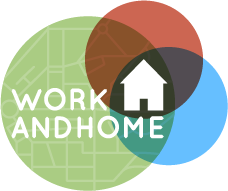This part of the project will investigate work-residence decisions and housing choices of households with home-based self-employed workers and provide new insights into the (economic) meanings of home. It will also examine coworking, in which home-based self-employed people work collaboratively alongside one another other in homes, cafes, community hubs and dedicated coworking spaces. While coworking has been linked with increased opportunities for innovation and networking, it is also attractive to home-based workers who experience social isolation when working alone at home.
- Do households choose a dwelling with having homeworking in mind or do they adapt their dwelling situation? How does this differ by neighbourhood type and opportunity structure?
- How do households with a home-based business search for dwellings?
- How do home-based self-employment and businesses change residence decisions? How is this linked with people’s life and career choices?
- How do home-based self-employed people shape their home-working spaces and reshape them related to transitions in work and life?
- What are the motivations and goals of home-based self-employed workers who take part in coworking?
- In what spaces does coworking take place? How does this differ between countries and between urban and rural neighbourhoods?
- How are home-based coworking networks organized, and how are home spaces adapted to enable coworking?
- How does home-based coworking impact on workers’ ideas of home?
Fieldwork will take place in the UK, France, Germany and the Netherlands. The research design is qualitative, and will use interviews, participant observation and visual methods to study workers’ residence decisions, homeworking practices and motivations for joining coworking networks.
The investigation in Germany will build on a household survey conducted by the ILS Dortmund in 2011. Fieldwork in Germany will take place in the Dortmund region, in two selected neighbourhoods.






